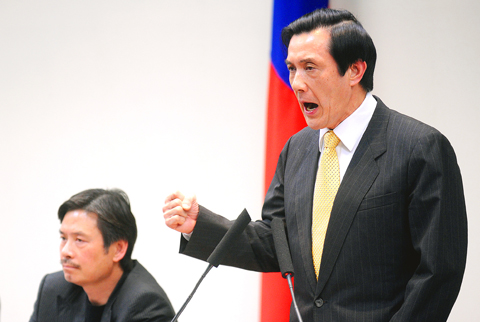President Ma Ying-jeou (馬英九) yesterday lauded Chinese Nationalist Party (KMT) legislators' efforts to pass the amendment to the Local Government Act (地方制度法) on Monday, vowing to assert the party's dominance in the legislature.
The KMT-dominated legislature pushed through the disputed amendment during a hastily arranged extra legislative session on Monday amid fistfights, yelling, shouting and pushing.
Ma, who doubles as KMT chairman, said his party did not let the public down because it helped push through the legal revision in spite of opposition from the Democratic Progressive Party (DPP).

PHOTO: CHIEN JUNG-FONG, TAIPEI TIMES
“It is not in the interest of one party, but the whole nation and the people,” he said.
“It will benefit not only the two parties, but also the public,” Ma said while chairing the party's weekly Central Standing Committee.
Ma criticized the DPP, saying it had really earned its name as an “opposition” party as it had opposed the bill simply for the sake of opposition.
“It's not a good phenomenon in a democracy,” he said.
“We respected the opinions of the minority parties, but they still boycotted the bill for no reason. I fully support the action taken by the KMT legislative caucus and hope to push through more bills using the same method,” the president said.
Ma said many were disappointed with the KMT because it could not pursue its agenda despite its legislative majority.
“It is not my problem alone, but that of the whole party,” he said. “As the chairman, I must change the situation. We are not the ruling party if we cannot make such changes.”
Ma's remark drew a round of applause from committee members.
KMT caucus whip Lin Yi-shih (林益世), who spoke before Ma during the meeting, threw down the gauntlet, saying the KMT legislative caucus would not seek war, but neither would it shy away if compromises fail to guarantee smooth passage of legislation.
Nonetheless, he urged the executive branch to strengthen its communications with the legislative branch.

Chinese Nationalist Party (KMT) Chairman Eric Chu (朱立倫), spokeswoman Yang Chih-yu (楊智伃) and Legislator Hsieh Lung-chieh (謝龍介) would be summoned by police for questioning for leading an illegal assembly on Thursday evening last week, Minister of the Interior Liu Shyh-fang (劉世芳) said today. The three KMT officials led an assembly outside the Taipei City Prosecutors’ Office, a restricted area where public assembly is not allowed, protesting the questioning of several KMT staff and searches of KMT headquarters and offices in a recall petition forgery case. Chu, Yang and Hsieh are all suspected of contravening the Assembly and Parade Act (集會遊行法) by holding

PRAISE: Japanese visitor Takashi Kubota said the Taiwanese temple architecture images showcased in the AI Art Gallery were the most impressive displays he saw Taiwan does not have an official pavilion at the World Expo in Osaka, Japan, because of its diplomatic predicament, but the government-backed Tech World pavilion is drawing interest with its unique recreations of works by Taiwanese artists. The pavilion features an artificial intelligence (AI)-based art gallery showcasing works of famous Taiwanese artists from the Japanese colonial period using innovative technologies. Among its main simulated displays are Eastern gouache paintings by Chen Chin (陳進), Lin Yu-shan (林玉山) and Kuo Hsueh-hu (郭雪湖), who were the three young Taiwanese painters selected for the East Asian Painting exhibition in 1927. Gouache is a water-based

Taiwan would welcome the return of Honduras as a diplomatic ally if its next president decides to make such a move, Minister of Foreign Affairs Lin Chia-lung (林佳龍) said yesterday. “Of course, we would welcome Honduras if they want to restore diplomatic ties with Taiwan after their elections,” Lin said at a meeting of the legislature’s Foreign Affairs and National Defense Committee, when asked to comment on statements made by two of the three Honduran presidential candidates during the presidential campaign in the Central American country. Taiwan is paying close attention to the region as a whole in the wake of a

OFF-TARGET: More than 30,000 participants were expected to take part in the Games next month, but only 6,550 foreign and 19,400 Taiwanese athletes have registered Taipei city councilors yesterday blasted the organizers of next month’s World Masters Games over sudden timetable and venue changes, which they said have caused thousands of participants to back out of the international sporting event, among other organizational issues. They also cited visa delays and political interference by China as reasons many foreign athletes are requesting refunds for the event, to be held from May 17 to 30. Jointly organized by the Taipei and New Taipei City governments, the games have been rocked by numerous controversies since preparations began in 2020. Taipei City Councilor Lin Yen-feng (林延鳳) said yesterday that new measures by